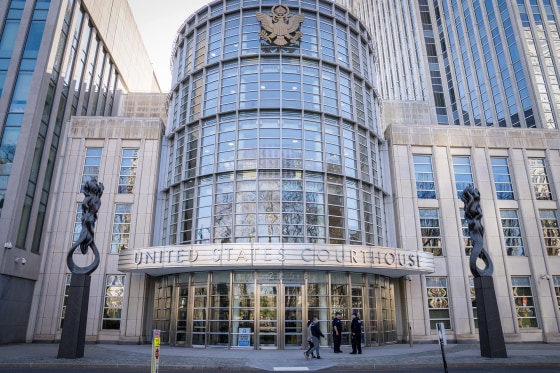A man was sentenced to 18 years in jail in New York for running a $24.5 million Ponzi scheme in which he defrauded over 200 victims in sham loan programs and used the money to fund a lifestyle of luxury goods and lavish hotel stays — while some of his bankrupt victims struggled to pay for chemotherapy.
Francius Marganda, 42, was sentenced Thursday in Brooklyn court in connection with running the three-year scheme, New York prosecutors announced. He’s been ordered to pay $8.5 million in restitution and $7.5 million in forfeiture.
Marganda ran the scheme from May 2019 to May 2021 while living in New York after overstaying his visa, prosecutors said.
In the plot, he solicited people — primarily Indonesian and Indo-American investors — to invest in two sham programs, called Easy Transfer and Global Transfer. He and co-conspirators falsely claimed the programs to be short-term, high-interest loan programs where investors could earn passive incomes, promising rates of return as high as 200% or more.
Instead of investing that money, Marganda and his co-conspirators allegedly misappropriated the funds for their own benefit, spending on real estate, luxury goods, paying off credit card bills while laundering the proceeds into their bank account.
In one instance, more than $3.8 million in scheme proceeds were transferred into one of Marganda’s personal accounts over 11 months, and more than $264,000 in proceeds was used to pay off his credit card bills, the release said.
The scheme collapsed in May 2021 when Marganda and co-conspirators stopped making payments to investors.
Marganda fled the U.S., and got an Indonesian passport under a fake name, prosecutors said. Then he continued to use the scheme money to stay in luxury hotels around the world — including France, the Maldives, Nepal and Thailand.
At least 237 victims, ranging in age from 24 to 84, were identified, with losses of more than $24.5 million.
The victims resided in at least 31 states, including New York, Washington, D.C., as well as Indonesia and Malaysia.
“Many of the victims had limited means and had pooled their resources with relatives and friends to make investments in U.S. dollars and Indonesian rupiah,” prosecutors said in a news release.
Victim statements were presented at Marganda’s sentencing and many said the fraud caused them to declare bankruptcy, lose nearly all their savings, and suffer serious hardship.
One victim struggled to pay for a family member’s chemotherapy, due to the fraud. Another struggled to pay for medical expenses associated with a family members’s stage 4 lung cancer diagnosis. Another lacked funds to travel and pay respects after both of their parents died, the release said.
In November 2023, Marganda was extradited from Singapore to the U.S. He pleaded guilty to securities fraud in July.
“Marganda’s attempt to evade justice by fleeing halfway across the world to hide in fancy hotels was futile, as he found out today in a federal courtroom in Brooklyn,” John J. Durham, the U.S. Attorney for the Eastern District of New York, said in a statement. “It is my hope that this prosecution will bring some measure of relief to the victims of Marganda’s fraud, who trusted him with their life savings because of their shared nationality and were cruelly exploited by him.”
Florian Miedel, an attorney for Marganda, told NBC News: “Although greatly disappointed in what is an extraordinary sentence for a first time offender, Mr. Marganda will use his time behind bars productively and will endeavor to pay his victims back when he is released.”
